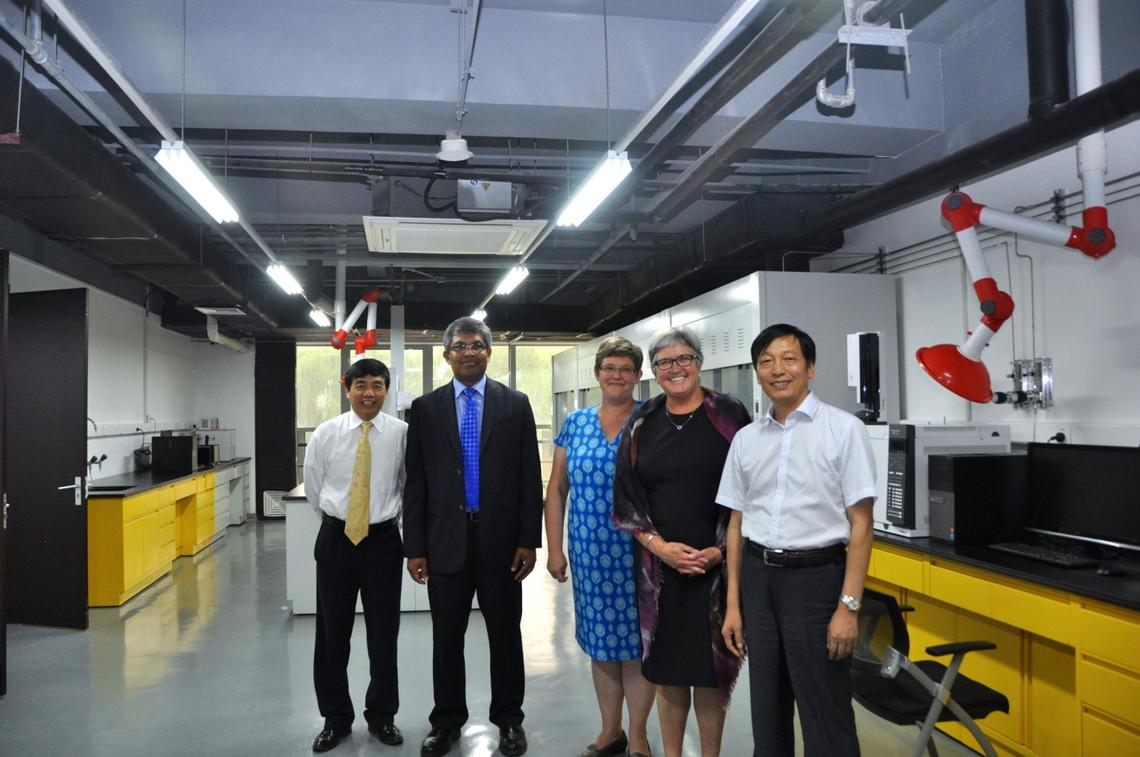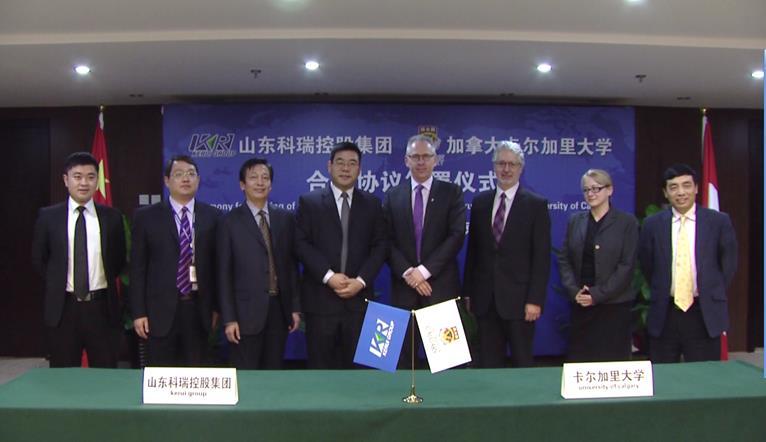
From left: John Chen, Janaka Ruwanpura, Lisa Young, Dru Marshall, and Qinghong Rong.
Oct. 22, 2014

From left: John Chen, Janaka Ruwanpura, Lisa Young, Dru Marshall, and Qinghong Rong.
The University of Calgary has partnered with a major Chinese oil and gas company to establish a collaborative energy research, education, and training site in Beijing — the first such facility in China for a university anywhere in the world.
An official agreement between the University of Calgary and Chinese partner Kerui Group will be signed Thursday, Oct. 23 at a ceremony in Beijing which includes senior representatives of the Chinese government, Chinese universities and national energy companies.
University of Calgary President Elizabeth Cannon is in Beijing for the ceremony, and is also participating in the 2014 China-Canada Unconventional Oil and Gas Summit and touring the new research facility.
“This exciting new international site expands our university’s already considerable strengths in unconventional oil and gas research, positioning us firmly as Canada’s Energy University,” Cannon said. “It will provide unique research collaborations for our faculty and unparalleled learning and training opportunities for our students and graduates.”
“The University of Calgary is a global leader in unconventional oil and gas research,” said Xian Yang, president of Kerui Group. “This mutual collaboration will have important impacts on research, education and personnel training.”
The Beijing Site, a joint effort by the university’s research and international units, is part of the university’s new Global Research Initiative for Unconventional Oil and Gas. This initiative aims to establish at least three world-leading research and education centres focused on unconventional hydrocarbon resources, including a Calgary centre and others in key energy locations around the world.
“The Beijing Site will be utilized as a platform for research, technology and educational exchanges between China and Canada,” said John Chen, director of the new research facility and professor of chemical and petroleum engineering in the Schulich School of Engineering. “China’s demand for unconventional oil and gas resource exploitation provides an enormous research opportunity for the University of Calgary.”

University of Calgary and Kerui Group meet.
Conventional hydrocarbon sources are declining worldwide. Unconventional resources, such as shale and tight gas and oil, coalbed methane, heavy oil, oilsands bitumen and gas hydrates, are the future of the global oil and gas industry. The University of Calgary — with more than 200 faculty members engaged in energy research and training, including 30 externally funded energy research chairs — is an international leader in geological, geophysical and engineering research related to the exploration and development of unconventional oil and gas reservoirs.
China has the world’s largest resources of shale gas — more than 25 trillion cubic metres of reserves — and needs advanced research and technologies to produce this resource while reducing environmental impacts.
Kerui Group, a private Chinese oil and gas company with 7,000 employees and operating in more than 45 countries, is contributing Cdn$11.25 million for startup infrastructure for the 4,000-square-metre research space in Beijing. The university will provide an in-kind contribution, rather than direct financial support, including faculty expertise and time spent working on projects there.
“The Beijing Site and Global Research Initiative are key steps in achieving the university’s Energy Research Strategy,” said, Ed McCauley, vice-president (research). “The new facility in China and the global initiative fit well with one of the strategy’s four ‘grand challenges’ for high-impact energy research in conventional hydrocarbon resources that makes the University of Calgary an international leader.” Another key step for the university was the announcement Oct. 16 of the appointment of renowned researcher Steven Bryant as the new Canada Excellence Research Chair for Materials Engineering for Unconventional Oil Reservoirs.
“The Beijing Site supports the university’s International Strategy to achieve several strategic goals of diversity, cross-cultural competencies, and research and educational partnerships to benefit students, faculty, research scholars, community and industry,” said Janaka Ruwanpura, vice-provost (international). “This facility will enhance joint research opportunities with Chinese universities and industry partners, joint PhD supervision and joint degrees, and training opportunities in the energy sector.”
The Beijing Site and the Global Research Initiative for Unconventional Oil and Gas are aligned with the university’s Eyes High strategy to become one of Canada’s top five research universities by its 50th anniversary in 2016.